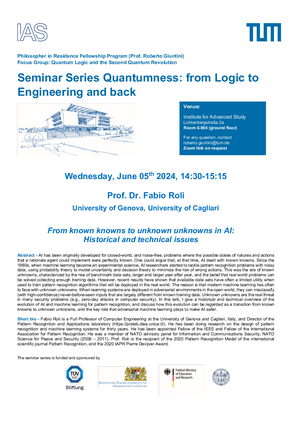Seminar Series Quantumness: from Logic to Engineering and back on June 05
Events |
The burgeoning research into quantum information and computation marks a significant milestone that can be dubbed “the second quantum revolution”. The first quantum revolution of the 20th century deeply changed the fundamental concepts of physics and our understanding of the physical world. The second quantum revolution of the 21st century is leading to dramatic technological changes in our society and shaping new conceptual and logical paradigms. Munich Quantum Valley serves as an exemplary case, bringing together fundamental research and practical application.
In the context of his Philosopher in Residence Fellowship, Prof. Roberto Giuntini has invited Prof. Fabio Roli (University of Genova, University of Cagliari), who will give a lecture on Wednesday, June 5, on the topic of "From known knowns to unknown unknowns in AI. Historical and technical issues".
The Seminar Series is organized by Prof. Dr. Roberto Giuntini (Philosopher in Residence) and his hosts:
Prof. Dr. Hans-Joachim Bungartz, Prof. Dr. Stefania Centrone, Prof. Klaus Mainzer
For further information, please contact: roberto.giuntini(at)tum.de
Date: June 05, 2024
Time: 14:30-15:15
Program:
14:30-15:15 Prof. Dr. Fabio Roli (University of Genova, University of Cagliari)
From known knowns to unknown unknowns in AI: Historical and technical issues
Abstract:
AI has been originally developed for closed-world, and noise-free, problems where the possible states of natures and actions that a rationale agent could implement were perfectly known. One could argue that, at that time, AI dealt with known knowns. Since the 1980s, when machine learning became an experimental science, AI researchers started to tackle pattern recognition problems with noisy data, using probability theory to model uncertainty and decision theory to minimize the risk of wrong actions. This was the era of known unknowns, characterized by the rise of benchmark data sets, larger and larger year after year, and the belief that real world problems can be solved collecting enough training data. However, recent results have shown that available data sets have often a limited utility when used to train pattern recognition algorithms that will be deployed in the real world. The reason is that modern machine learning has often to face with unknown unknowns. When learning systems are deployed in adversarial environments in the open world, they can misclassify (with high-confidence) never-before-seen inputs that are largely different from known training data. Unknown unknowns are the real threat in many security problems (e.g., zero-day attacks in computer security). In this talk, I give a historical and technical overview of the evolution of AI and machine learning for pattern recognition, and discuss how this evolution can be regarded as a transition from known knowns to unknown unknowns, and the key role that adversarial machine learning plays to make AI safer.
Short bio: Fabio Roli is a Full Professor of Computer Engineering at the University of Genova and Cagliari, Italy, and Director of the Pattern Recognition and Applications laboratory (https://pralab.diee.unica.it/). He has been doing research on the design of pattern recognition and machine learning systems for thirty years. He has been appointed Fellow of the IEEE and Fellow of the International Association for Pattern Recognition. He was a member of NATO advisory panel for Information and Communications Security, NATO Science for Peace and Security (2008 – 2011). Prof. Roli is the recipient of the 2020 Pattern Recognition Medal of the international scientific journal Pattern Recognition, and the 2020 IAPR Pierre Devijver Award.
Venue:
Institute for Advanced Study
Lichtenbergstraße 2a
Room 0.004 (ground floor)
85748 Garching
